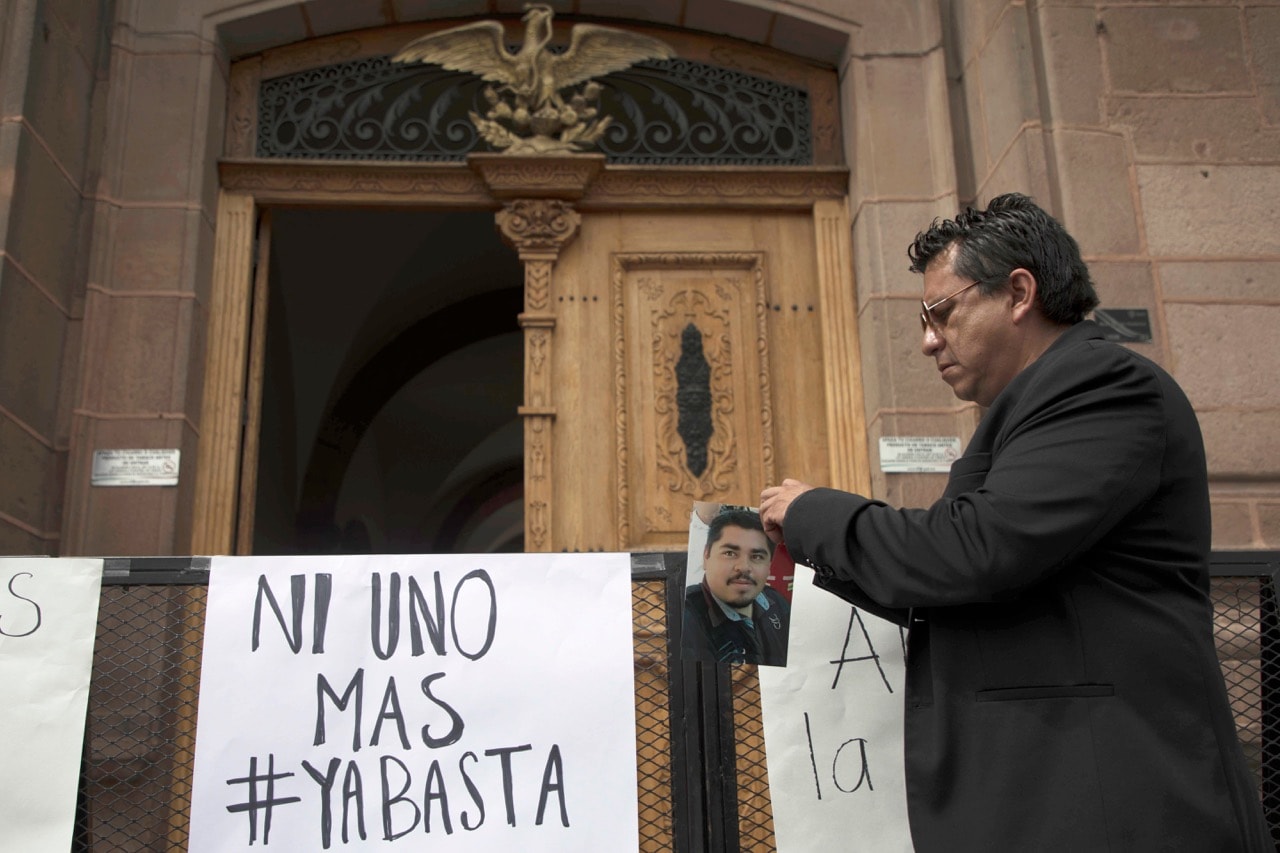A roundup of key free expression news in the Americas, based on IFEX member reports.
October was marked, yet again, by deaths of journalists who simply sought to freely exercise their profession.
In Mexico, photographer Edgar Esqueda Castro was kidnapped and assassinated in San Luis Potosí. Over the last several months, Esqueda Castro had received a number of threats issued by local police officers while he was carrying out his work.
The freedom of expression environment in San Luis Potosí has hit a historic low, with fear becoming the norm among media personnel. After Esqueda Castro’s disappearance, torture and assassination, several journalists reported on aggressive actions perpetrated by public officials, according to an investigation undertaken by IFEX member ARTICLE 19.
In addition, impunity continues to reign in a number of cases in Mexico. An example is the 23 March 2017 assassination of Miroslava Breach. Freedom of expression organisations are concerned about the lack of results in the investigation into the case, which is being conducted by both local and federal authorities.
Meanwhile, in Honduras commentator Osmin España died from gunshot wounds in Santa Rosa de Copán on 4 October. The Organisation of American States’ Office of the Special Rapporteurship for Freedom of Expression condemned the assassination and urged the authorities to investigate the crime with due diligence. Impunity in these types of cases in Honduras exceeds 90%. Since 2001, 69 people with links to the media have lost their lives in violent circumstances, but sentencing of those responsible has only taken place in six cases.
Along this same vein, a team of international specialists determined that the assassination of Honduran activist Berta Cáceres was planned at least four months in advance and that leaders of the company in charge of constructing the dam she was opposing may have been involved.
And journalists are not safe while covering events either. In Colombia, indigenous commentator Efigenia Vásquez Astudillo died on 9 October following clashes between members of the Kokonuko community and ESMAD riot control forces in Puracé, Cauca department.
In Chile, there was renewed concern over the reach of the surveillance, control and spying powers of the government. The detention of eight Mapuche community members at the beginning of the month lead to questions about the surveillance capabilities of the police and whether any effective counterbalances are in place to guarantee respect for fundamental rights.
Venezuela has continued its harassment of the free press. In nearly all cases, the actions against the press originate with the government of Nicolás Maduro. At the beginning of the month, journalists Roberto Di Matio (Italian), Filippo Rossi (Swiss) and Jesús Medina (Venezuelan) were held against their will in a military prison.
In addition, on 23 October, the daily newspaper La Verdad announced that it would be ceasing circulation of its print edition due to a shortage of paper. La Verdad was the fourth newspaper to halt circulation for an indefinite period this year due to restrictions on the basic inputs required for printing.
In Uruguay, 23 October marked the Day of the Journalist. In commemoration, IFEX member CAinfo updated its report chronicling threats to freedom of expression experienced by journalists carrying out their work in the country. To date in 2017, there have been 17 threats to freedom of expression: one high level threat, involving an assassination attempt, in addition to 13 medium and three low level threats.
In Ecuador, the first 100 days with recently-elected president Lenin Moreno were marked by a new era in relations between the government and the media, with Moreno issuing an invitation to dialogue and offering “a truce” to the media.
In addition, IFEX member Fundamedios was awarded the Horacio Aguirre Prize, bestowed by the Inter-American Institute for Democracy (IID), for its ongoing commitment to defending freedom of expression.
In brief
Canada: Journalists Elena Milashina, Robyn Doolittle and Kim Bolan will be recognised for their work in the media and in support of freedom of expression during IFEX member CJFE’s Annual Gala.
Panama: The National Telecommunications Directorate, under the National Public Services Authority, approved a public consultation process to determine a date for shutting down analog services in the country.
In Paraguay, several civil society organisations urged congress to reject a censorship project aimed at compelling Internet service providers to remove content published by anonymous users that could be considered “offensive or defamatory” against political parties and candidates.
In Guatemala, Sergio Waldemar Cardona Reyes was sentenced to 30 years in prison for the assassination of journalist Danilo López, a small gain in the fight against the impunity that reigns in the country in cases involving these types of crimes.
In Argentina, IFEX member FOPEA will hold its Congress together with the Latin American Congress for Investigative Journalism, which is coordinated by IPYS, IFEX’s member in Peru.
In both countries there are issues to be dealt with: in Argentina, the Security Ministry approved the “General Operational Protocol regarding Personal Registry and Detention involving Individuals Belonging to the LGBT Community.” Soon after learning of the move, various sexual diversity organisations and LGBT activists expressed their profound concern and condemnation of this regulation, which they consider to constitute a warning rather than a guarantee of respect for rights.
Meanwhile, in Peru, trans activist Britany Cervantes Bravo, a member of the Feminas organisation, was attacked by two men who stabbed her in the chest with pieces of glass.
